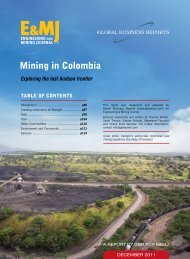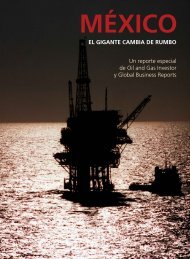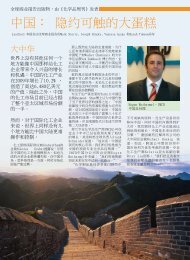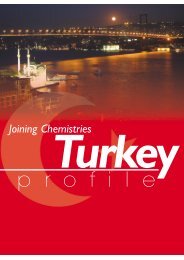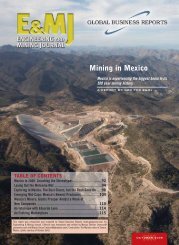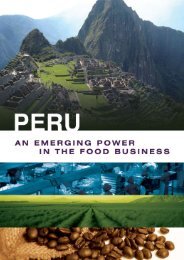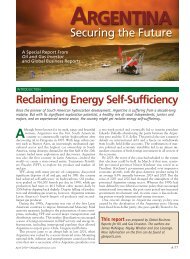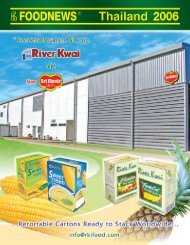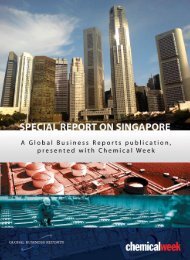Turkey Speciality Chemicals 2006 - GBR
Turkey Speciality Chemicals 2006 - GBR
Turkey Speciality Chemicals 2006 - GBR
Create successful ePaper yourself
Turn your PDF publications into a flip-book with our unique Google optimized e-Paper software.
<strong>Turkey</strong> special report<br />
Bulent Karaagac, president of Bilim Pharmaceuticals,<br />
believes that generic products are the future and he<br />
aims to focus on end-user products more than fine<br />
chemicals and APIs.<br />
Bulent Atabay, president of Atabay<br />
Pharmaceuticals also believes that generics are the<br />
future, even though he has promoted back-integration<br />
and entered the manufacturing of fine chemicals.<br />
Atabay’s fine chemicals facility specialises in<br />
hydrogen gas production for paraminophenol and<br />
paracetamol, high and low pressure hydrogenations,<br />
aminations, cynanide chemistry and resolutions.<br />
Atabay himself says that his company is the<br />
world’s leading producer of paracetamol and that he<br />
would like to specialise in this product. He wants to<br />
start making end-user generic branded products for<br />
the rapidly growing domestic market. His daughter,<br />
the firm’s QA manager, Zeynep, is looking for new<br />
markets, with the US high on her wish list.<br />
On the other side of the data exclusivity scale are<br />
innovator multi-nationals, for whom patents are very<br />
important. For George Hadjiev, general manager of<br />
Roche <strong>Turkey</strong>, data exclusivity is crucial to the future<br />
development of the industry. He argues that if<br />
<strong>Turkey</strong> could attract more foreign investment, then<br />
R&D activities could evolve.<br />
Though data exclusivity is a concern, however, it<br />
has not hampered Roche in its business development.<br />
Hadjiev says that Roche has been successful<br />
in adopting the global strategy of innovative health<br />
care in <strong>Turkey</strong>.<br />
“In 2004, the split between generic and original<br />
production was 50/50. In three years we plan to<br />
make it 70/30 or even 80/20 in favor of original<br />
products,” he says. <strong>Speciality</strong> care is a niche market<br />
with value-added products that also promise higher<br />
margins. Concentration on fields such as oncology<br />
and virology has given Roche a comparative advantage<br />
over many of its Turkish competitors.<br />
On one hand, <strong>Turkey</strong>’s pharmaceutical sector is in<br />
dire need of foreign investment. On the other, legislation<br />
is being passed that ultimately favours local<br />
manufacturers.<br />
The industry has great potential and is very attractive,<br />
but has only attracted limited amounts of foreign<br />
direct investment - 1% of the global total in<br />
recent years. Chaotic legislation, recurrent economic<br />
instability, lack of transparency and a large black<br />
market have scared potential investors away.<br />
Ironically, more obstacles in the form of new pricing<br />
schemes have been put into place to hinder foreign<br />
business, and this, high VAT rates and issues in<br />
the distribution channels have decreased the industry’s<br />
profitability.<br />
The ‘cost plus mark-up’ pricing mechanism and<br />
margin caps were both abolished in 2004. Under the<br />
new mechanism, drug prices are adjusted in line with<br />
the lowest price of the equivalent product in the EU.<br />
Adjustments need to be approved by the Ministry<br />
of Health and are quoted in Turkish lira. Accordingly,<br />
a reference factory price is calculated using the average<br />
price in the two countries where the prices are<br />
lowest of identified EU countries. The price is then set<br />
at 90% of the reference price.<br />
However, the price of a generic product may not<br />
exceed 70% of the original product price, set<br />
Roche’s new facility in Gebze<br />
Hadjiev - Roche will focus on original products<br />
according to the above method. Prices are adjusted<br />
if the lira depreciates by more than 5% in a 30-day<br />
period. Companies may apply to the Ministry of<br />
Health for price revisions, which need to be evaluated<br />
within ten days of applications.<br />
The old system had encouraged transfer pricing<br />
by large multi-national manufacturers, importing<br />
large amounts of medicines and active ingredients,<br />
thus creating an unfair competitive environment for<br />
local companies. In addition, delays in price adjustments<br />
have occasionally pressured the margins of<br />
domestic producers.<br />
All in all, local generics manufacturers have benefited<br />
from the new pricing scheme, which poses a disincentive<br />
for multinationals to import large amounts<br />
of medicines and APIs and encourages the production<br />
of raw materials in <strong>Turkey</strong>. This is mainly based<br />
around the production of antibiotic and analgesic<br />
APIs via fermentation, extraction and synthesis.<br />
11 private sector plants and one in the public sector<br />
are in operation producing pharmaceutical raw<br />
materials in <strong>Turkey</strong>. Most investments are made by<br />
privately owned companies. 80% of raw material<br />
requirements are met by imports.<br />
In 2002, 3,909 tonnes of raw materials were produced<br />
in <strong>Turkey</strong>. The country is self-sufficient in certain<br />
drugs such as morphine and its derivatives and<br />
paracetamol, which is also exported. Imports have<br />
increased steadily over the years and reached<br />
€2,572 million in 2004, including some products in<br />
finished forms.<br />
Most come from Germany, Italy, the UK, France,<br />
Switzerland and the US. The main categories are<br />
biotechnological preparations, implanted products,<br />
new transport systems, vaccines, blood factors, products<br />
with controlled secretion systems, insulin, cancer<br />
drugs, several hormones, radionuclides, certain<br />
ophthalmic preparations and antidotes.<br />
Exports by Turkish companies have also increased<br />
steadily in recent years, reaching €243 million in<br />
2004. About 60% are packed ready-for-use pharmaceutical<br />
products, notably those containing penicillin,<br />
antibiotics and alkaloid medicaments.<br />
Germany, the US, Austria, Belgium, Finland, the<br />
Netherlands, the UK, Switzerland, Italy and Japan<br />
are the main export markets.<br />
To succeed in foreign markets where both the<br />
cost of adopting technical rules and the intensity of<br />
competition are increasing, the Turkish pharmaceuticals<br />
industry needs to make both technical and<br />
marketing investments or start joint ventures and<br />
alliances with foreign players.<br />
MN Pharmaceuticals recently established a strategic<br />
alliance with PAR Pharmaceuticals to develop<br />
and market generic versions of injectable pharmaceuticals.<br />
The companies will collaborate on the<br />
development of up to ten generic injectable drugs.<br />
Meanwhile, Bilim’s Karaagac puts exports, especially<br />
to the US, at the top of his agenda. Eczacıbası’s Fine<br />
<strong>Chemicals</strong> export sales were €1.7 million in 2004,<br />
€3.4 million in 2005 and are expected to reach €8.4<br />
million in 2008 as the company reorganises its structure<br />
to increase its exports from 10% to 30% of sales.<br />
One major goal of Eczacıbası Pharmaceuticals<br />
Manufacturing’s product development activities, in<br />
addition to supplying new products to the domestic<br />
market, is to be the first to launch generic pharmaceuticals<br />
into international markets, particularly in the<br />
EU. Evidence of its success in this area was the development<br />
of the first four injectable forms of<br />
Ceftazidime, a cephalosporin molecule, for Europe.<br />
Eczacıbası has also signed an agreement with<br />
Ivax to develop, register and manufacture 20 pharmaceuticals<br />
for Eastern and Western European markets.<br />
This is expected to make a significant contribution<br />
to the company’s exports from <strong>2006</strong>.<br />
For some firms, forays abroad are paying off.<br />
Abdi İbrahim, <strong>Turkey</strong>’s pharmaceuticals leader has<br />
established its own organisations in markets with big<br />
potential, such as Russia and Kazakhstan, and supplied<br />
licences to countries such as Indonesia and<br />
Lebanon, while also obtaining pharmaceutical production<br />
licences for EU member countries. Sales to<br />
Denmark, Germany and France should begin soon.<br />
Erman Atasoy, general director of Abdi İbrahim<br />
Pharmaceuticals says: “We follow the developments<br />
in the world’s drug sector and the production technologies<br />
very closely. We assess the developments,<br />
taking into consideration the requirements of the<br />
Turkish drug sector, and thus maintain our leadership<br />
in market share. We also introduce the new international<br />
molecules to the domestic market through our<br />
licensors and take advantage of investments abroad.”<br />
Strategic planning has never been so high on<br />
companies’ agendas. Having recovered from a<br />
financial crisis and started negotiations with the EU,<br />
many pharmaceuticals businesses have restructured<br />
their business plans to pair generics with originals<br />
and can fulfill the demands of the domestic market<br />
while looking abroad and are investing in R&D.<br />
The presence of multi nationals has helped Turkish<br />
companies to be more technologically advanced. The<br />
foreign players themselves have brought with them<br />
their know-how and capital to tap an extremely large<br />
market. With key legislation in place, the future has<br />
never been so bright. Both domestic and foreign<br />
companies have many obstacles ahead of them, but<br />
the perspectives have become much clearer.<br />
<strong>Speciality</strong> <strong>Chemicals</strong> Magazine January/February <strong>2006</strong> 61<br />
www.specchemonline.com




